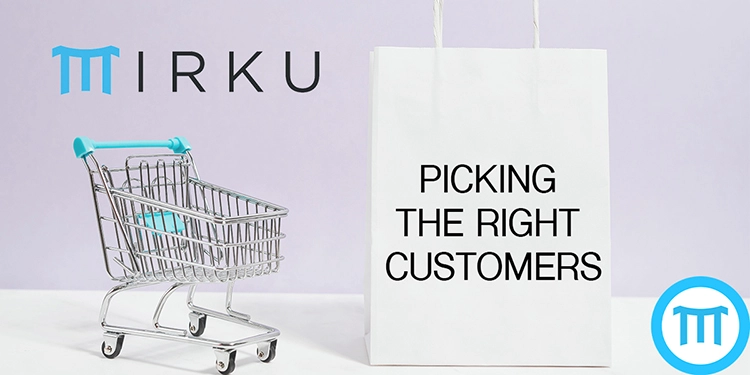Is Choosing The Right Client More Important Than Delivering Results?
An alternative is presented here that you might find interesting.
Consider the following questions;
- What does it mean to choose the right client?
- and what does it mean to deliver results?
Modern businesses are tasked with objectives that can seemingly be contradictory.
On the one hand, a business must garner an audience, build and demonstrate credibility and authority. On the other hand, a business must be conscientious about costs—one of the more elusive concepts in business and economics. Costs come in all shapes and sizes. The most insidious of which might be opportunity costs or the costs of expanding finite resources where they may have better utilized them.
Of course, this is very tricky for a new business because opportunities may appear to be limited, and as a matter of fact, also highly limiting. Perhaps due to a lack of demonstrated performance, a lack of reputation, or the lack of cash flows that make the individual organization desperate to get anybody in the door. Much like that schoolmate going through the most awkward physical phase searching for a prom date, Shrek would seem like a great choice when the alternative appears to be nothing.
That said, the costs of saying “No” are often miscalculated. Because the actual costs have not been conceived, results can not be perceived in any given customer encounter. An example would be taking on a bad client at the expense of a future good one. (Zero-sum equation) Sometimes one in hand costs you ten in the bush. What’s worse is you don’t realize it.
For a new business, in particular, this poses a bit of a catch 22. It won’t appear to be as easy as “pick a better client.” It reminds me of the tired employee interview move where you find yourself auditioning for them in a Bugs Bunny-style game of reverse psychology. Sorry, chump – my money, my rules. The market value of brazen basic-bitch solopreneurs is ever decreasing.
Whereas the market for those who can speak the truth with humility is a rarity of the utmost value — know your lane. Perhaps there is a better way to position the questions previously asked, as such;
- Can these two seemingly contradictory options (bad customers VS good customers) be reconciled in some way?
- If by considering the context of what it means to have a client, customer, or prospect, could we deliver desired results to each and all equitably?
Good questions answer themselves, and sometimes the best answers to questions divorced from context are often better questions.
Does someone consuming evergreen content fall into the category of “client”?
When I think of a client, I think of someone who is paying me in some way. They are expending resources, and I benefit from that expense (Hopefully in a mutually beneficial way). Is it wrong to think of them as a client? I think it’s safe to say, at the very least, they are consumers of services. But what are the costs? The cool thing about products of this sort is that they are seemingly roughly the same irrespective of the size of the audience.
Problem Solved, Right? Wrong.
More often than not, all of a thought leader’s content tells people that success is so easy that a monkey can do it. Therefore, should the thought leader be surprised when the monkeys are insulted by your refusal to court them more substantively? After all, their investment in terms of time, energy, and pain are far beyond yours.
This is where thought leadership fails.
When it divorces itself from the truth and the prospective client, in a sort of conspiratorial way, starts to believe the world is devoid of sharp edges. “Buyer beware – this content is not for you,” says no content, no software, no certification course ever.
Therein Lies The Rub.
Good copy, content, certs, whatever has two jobs to do (not just one). It must repel, as well or better than it attracts, especially if you’re the poor bastard at the bottom of the funnel. By the time it gets to you, it’s likely too late. Your time is finite, your opportunity costs are real, and most importantly, your reputation is vulnerable.
Vulnerable to the bruised egos of foolhardy investors. Those who bought into the idea that they had a shot at the big leagues. They should be happy in the swamp with Shrek and the rest of the undesirables.
It’s Not Their Fault – It’s Ours.
Everyone loves a Cinderella story. Rudy is one of my favorite movies. Forrest Gump artistically isolates the purity of spirit and conviction like no other. The thing that makes those stories (yes, they do happen in the real world) so compelling is that they’re extremely rare. Though in no way to run a sports team, business, or platoon.
The hard and fast principle is that there are winners and losers in life – and the prevailing tendency is that winners win and losers lose. I could tell you that you need to bring in better clients or hire better people, but it’s most likely that your destiny is already hard-wired.
You see, Pareto distributions don’t just apply to your customers and employees; they apply to you as well. We are all subject to inequitable cosmic forces, and projecting them onto others makes you less vulnerable to those standards.
Therefore my recommendation is that not only should entrepreneurs seek better clients and fire the bad ones. But most of them should fire themselves in advance to spare us the time and energy to tell them something they should have heard at the beginning of the funnel.
In closing, allow me to steal that famous motivational Charles S. Dutton line from Rudy;
“You’re 5 foot nothin’, 100 and nothin’, and you have barely a speck of athletic ability. And you hung in there with the best college football players in the land for 2 years. And you’re gonna walk outta here with a degree from the University of Notre Dame. In this life, you don’t have to prove nothin’ to nobody but yourself. And after what you’ve gone through, if you haven’t done that by now, it ain’t gonna never happen“.
Will that be Visa, MasterCard, or American Express?


